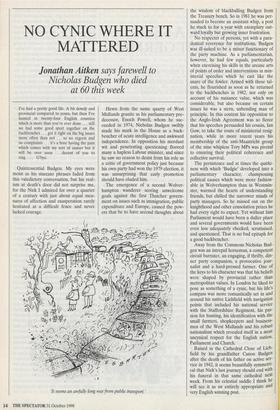NO CYNIC WHERE IT MATTERED
Jonathan Aitken says farewell to Nicholas Budgen who died at 60 this week
I've had a pretty good life. A bit dowdy and provincial compared to yours, but then I've hunted in twenty-four English counties which is more than you've ever done ... still we had some good sport together on the backbenches ... got it right on the big issues more often than not . .. so no regrets and no complaints ... it's a bore having the pain which comes with my sort of cancer but it will be over soon .. . decent of you to ring.. .. G'bye.
Quintessential Budgen. My eyes were moist as his staccato phrases faded from this valedictory conversation, but his real- ism at death's door did not surprise me, for the Nick I admired for over a quarter of a century with just about equal mea- sures of affection and exasperation rarely hesitated at a difficult fence and never lacked courage. Hewn from the same quarry of West Midlands granite as his parliamentary pre- decessor, Enoch Powell, whom he suc- ceeded in 1974, Nicholas Budgen swiftly made his mark in the House as a back- bencher of acute intelligence and awkward independence. In opposition his mordant wit and penetrating questioning floored many a hapless Labour minister, and since he saw no reason to desist from his role as a critic of government policy just because his own party had won the 1979 election, it was unsurprising that early promotion should have eluded him.
The emergence of a second Wolver- hampton wanderer scoring unwelcome goals against the first Thatcher govern- ment on issues such as immigration, public expenditure and Europe, caused the pow- ers that be to have second thoughts about `It seems an awfully long way from public transport.' the wisdom of blackballing Budgen from the Treasury bench. So in 1981 he was per- suaded to become an assistant whip, a post he stuck to for a year with exemplary out- ward loyalty but growing inner frustration.
No respecter of persons, yet with a para- doxical reverence for institutions, Budgen was ill-suited to be a minor functionary of the party machine. As a parliamentarian, however, he had few equals, particularly when exercising his skills in the arcane arts of points of order and interventions in min- isterial speeches which he cast like the snare of the fowler. Armed with these tal- ents, he flourished as soon as he returned to the backbenches in 1982, not only on account of his nuisance value, which was considerable, but also because on certain issues he was a stern, unbending man of principle. In this context his opposition to the Anglo-Irish Agreement was so fierce that his speeches persuaded his cousin, Ian Gow, to take the route of ministerial resig- nation, while in more recent years his membership of the anti-Maastricht group of the nine whipless Tory MPs was pivotal to ensuring their political coherence and collective survival.
The persistence and at times the quirki- ness with which `Budgie' developed into a parliamentary character, championing political causes which were more fashion- able in Wolverhampton than in Westmin- ster, warmed the hearts of understanding friends, but chilled the narrower minds of party managers. So he missed out on the knighthood and other consolation prizes he had every right to expect. Yet without him Parliament would have been a duller place and several governments would have been even less adequately checked, scrutinised, and questioned. That is no bad epitaph for a good backbencher.
Away from the Commons Nicholas Bud- gen was an intrepid horseman, a competent circuit barrister, an engaging, if thrifty, din- ner party companion, a provocative jour- nalist and a hard-pressed farmer. One of the keys to his character was that his beliefs were shaped by provincial rather than metropolitan values. In London he liked to pose as something of a cynic, but his life's compass was more romantically set in and around his native Lichfield with navigation points that included his national service with the Staffordshire Regiment, his pas- sion for hunting, his identification with the small farmers, shopkeepers and business- men of the West Midlands and his robust nationalism which revealed itself in a most uncynical respect for the English nation, Parliament and Church.
Raised in the Cathedral Close of Lich- field by his grandfather Canon Budgen after the death of his father on active ser- vice in 1942, it seems beautifully symmetri- cal that Nick's last journey should end with his fiineral in that same cathedral next week. From his celestial saddle I think he will see it as an entirely appropriate and very English winning post.


















































































 Previous page
Previous page